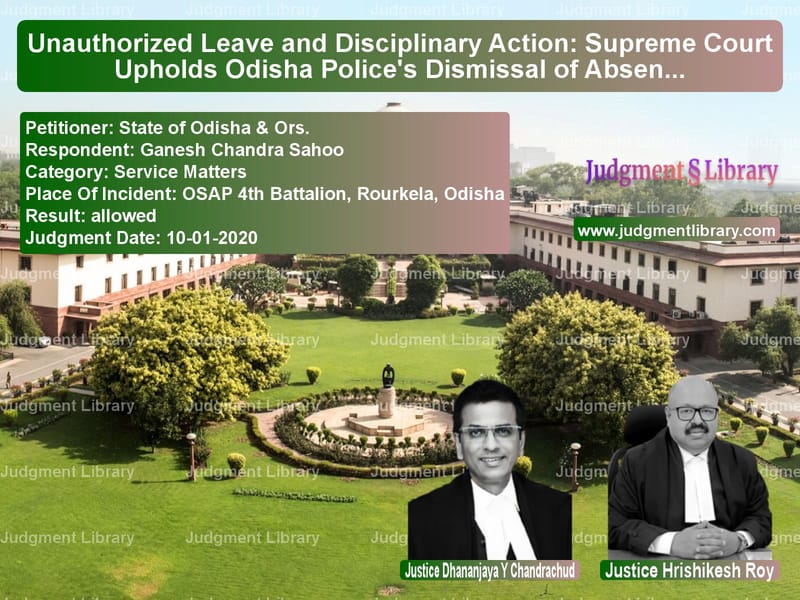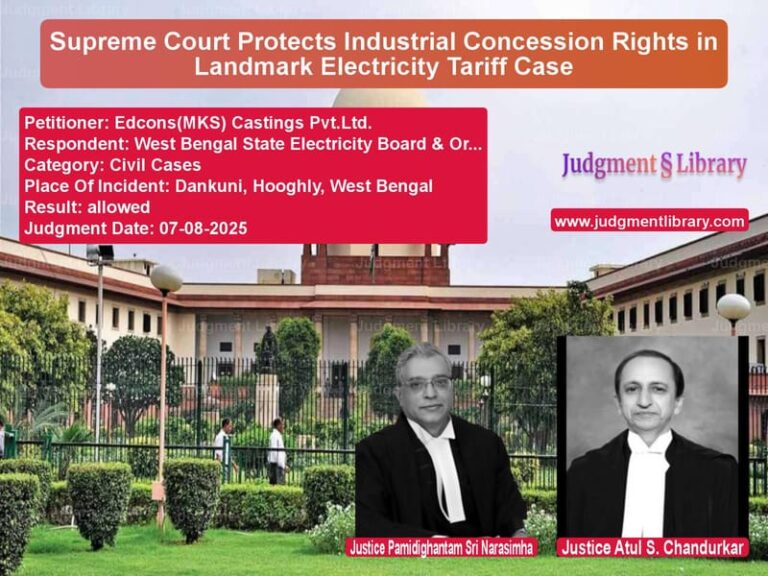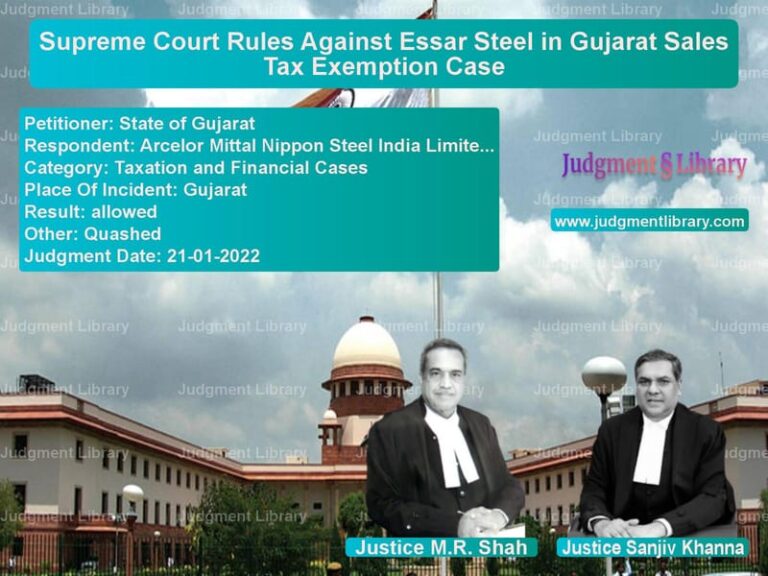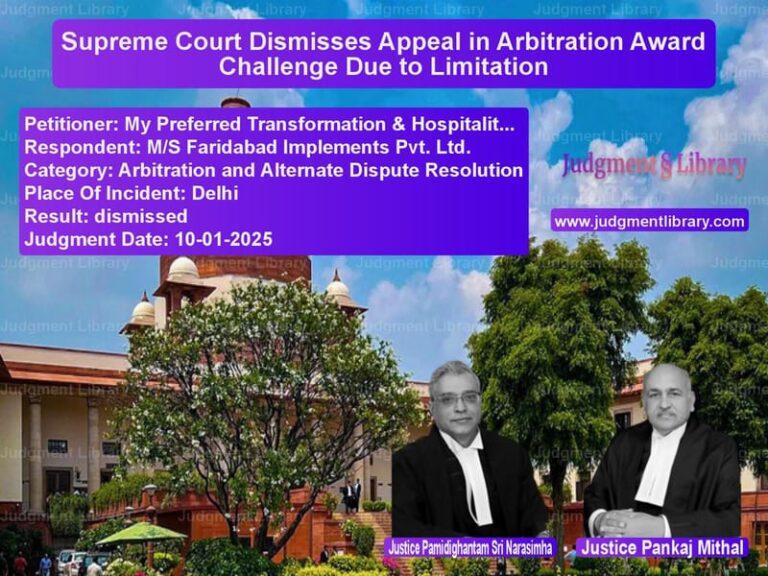Unauthorized Leave and Disciplinary Action: Supreme Court Upholds Odisha Police’s Dismissal of Absentee Employee
The case of State of Odisha & Ors. vs. Ganesh Chandra Sahoo revolves around a prolonged unauthorized absence from duty and the subsequent disciplinary action taken by the Odisha Police against the respondent. The Supreme Court overturned the Orissa High Court’s intervention, reinstating the disciplinary action taken by the authorities, thereby reaffirming the principle that government employees must adhere to service rules and regulations.
Ganesh Chandra Sahoo, the respondent in this case, served as a Follower Orderly in the OSAP 4th Battalion, Rourkela. He obtained leave from May 25, 1991, to June 4, 1991, to visit his ailing mother but never returned to duty. Instead, he claimed to have suffered from cerebral malaria, which allegedly led to mental illness, making him incapable of resuming his duties. This absence continued for almost seven years before any legal challenge was initiated.
Background of the Case
The issue began when Sahoo failed to return to work after his sanctioned leave expired. When he applied for an extension of leave due to illness, the police department directed him to appear before the Chief District Medical Officer (CDMO) at Cuttack for a medical examination. However, he failed to do so. Further notices were issued in October 1991 and again in March 1992, warning that his continued absence without verification would result in disciplinary action. Despite these repeated instructions, Sahoo neither responded nor appeared for a medical evaluation.
Due to his prolonged absence without authorization, a departmental inquiry was initiated in October 1992. The charge memo and inquiry notices were duly served to him at his native place. However, Sahoo did not participate in the proceedings and refused to accept official communications. Consequently, the inquiry was conducted ex parte, and he was found guilty of unauthorized absence. Following due process, the police department issued a second show cause notice proposing dismissal, which also went unanswered. As a result, Sahoo was formally discharged from service on December 30, 1993.
Petitioner’s Arguments
The State of Odisha, along with the Director General and Inspector General of Police, contended that Sahoo had ample opportunities to defend himself but deliberately evaded official communications. They argued that:
- Despite multiple notices, Sahoo failed to appear for a medical examination, which could have substantiated his illness claim.
- His prolonged absence without intimation disrupted the functioning of the police force and violated service rules.
- The departmental inquiry was conducted fairly, providing him with adequate opportunity to present his defense.
- The appeal submitted by Sahoo four years after his discharge was time-barred, yet it was considered and rejected on merits.
Respondent’s Arguments
Sahoo defended his prolonged absence by citing severe mental illness, which he claimed was triggered by cerebral malaria. In his legal challenge, he presented a medical certificate issued in 1998—almost five years after his dismissal—by Dr. G.C. Kar, Head of the Department of Psychiatry at SCB Medical College, Cuttack. The certificate stated:
“He has been treated for a long period because of repeat cyclic attack of Maniac Depression Psychosis following cerebral malaria from 03.06.91 till date. During the period under treatment, he was incapable of taking responsibility and was advised rest.”
Based on this certificate, Sahoo argued that he was not mentally fit to respond to official notices or attend the departmental inquiry. He further claimed that when he recovered in 1998, he sought reinstatement but was denied by the authorities.
Tribunal and High Court Proceedings
After several years, Sahoo approached the Orissa Administrative Tribunal in 2003, challenging his dismissal. The Tribunal dismissed his case, questioning the validity of the medical certificate and highlighting that no evidence suggested he was undergoing psychiatric treatment before 1998. The Tribunal found that:
- The medical certificate lacked credibility since it was issued after a gap of seven years without any supporting medical records.
- Sahoo deliberately avoided medical examination by the CDMO when directed by his department.
- The disciplinary action was carried out lawfully and with sufficient opportunity for Sahoo to defend himself.
Dissatisfied with the Tribunal’s decision, Sahoo filed a writ petition in the Orissa High Court. The High Court took a lenient view, accepting the medical certificate and ruling that Sahoo’s mental illness justified his non-response to official notices. The Court substituted his dismissal with compulsory retirement, reasoning that the punishment imposed was excessive.
Supreme Court’s Ruling
The State of Odisha challenged the High Court’s decision before the Supreme Court. After thoroughly reviewing the case, the Supreme Court set aside the High Court’s ruling and upheld the original dismissal order.
The Supreme Court found that the High Court erred in relying solely on the medical certificate issued in 1998. The Court observed:
“If the respondent had actually suffered from cerebral malaria since 3.06.1991 and was subjected to frequent cyclic attack of Maniac Depression Psychosis, as claimed, necessary proof of such suffering from the concerned Doctor/Hospital who were providing him the treatment, ought to have been produced.”
The Court also noted that the doctor who issued the certificate had no prior medical history of treating Sahoo and that the reference for the certificate was made by an MLA rather than a treating physician. The Court held:
“In the absence of relevant and contemporaneous medical records, the High Court should not have interfered with the disciplinary action and ordered for a lesser penalty.”
Key Takeaways from the Judgment
- Absence Without Justification: Government employees must follow official procedures for medical leave and verification. Absence without proper documentation can lead to dismissal.
- Medical Evidence Must Be Contemporaneous: Presenting a medical certificate issued years after the alleged illness without supporting records is insufficient in court.
- Doctrine of Proportionality Not Applicable: The Court ruled that since Sahoo’s absence spanned seven years, it could not be compared to cases where shorter absences led to lesser penalties.
- Fairness in Disciplinary Proceedings: The Supreme Court reaffirmed that Sahoo was given adequate opportunities to present his defense, and his refusal to participate did not make the disciplinary process unfair.
Conclusion
This judgment serves as a precedent for cases involving unauthorized leave and disciplinary action. It underscores that government employees must comply with service rules and that courts should exercise caution when considering post-facto medical justifications. By upholding the dismissal, the Supreme Court reinforced the importance of accountability and adherence to due process in public sector employment.
Petitioner Name: State of Odisha & Ors..Respondent Name: Ganesh Chandra Sahoo.Judgment By: Justice Dhananjaya Y Chandrachud, Justice Hrishikesh Roy.Place Of Incident: OSAP 4th Battalion, Rourkela, Odisha.Judgment Date: 10-01-2020.
Don’t miss out on the full details! Download the complete judgment in PDF format below and gain valuable insights instantly!
Download Judgment: State of Odisha & Or vs Ganesh Chandra Sahoo Supreme Court of India Judgment Dated 10-01-2020.pdf
Direct Downlaod Judgment: Direct downlaod this Judgment
See all petitions in Disciplinary Proceedings
See all petitions in Termination Cases
See all petitions in Public Sector Employees
See all petitions in Judgment by Dhananjaya Y Chandrachud
See all petitions in Judgment by Hrishikesh Roy
See all petitions in allowed
See all petitions in supreme court of India judgments January 2020
See all petitions in 2020 judgments
See all posts in Service Matters Category
See all allowed petitions in Service Matters Category
See all Dismissed petitions in Service Matters Category
See all partially allowed petitions in Service Matters Category







